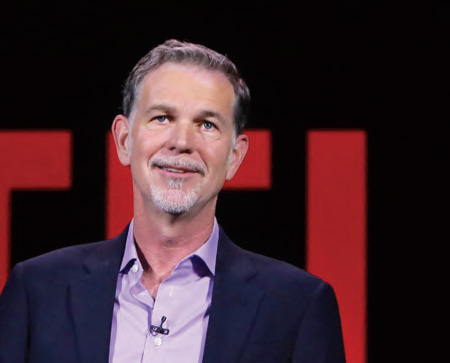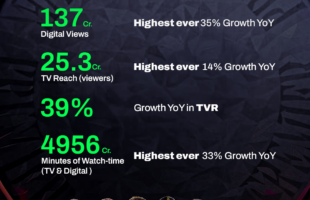

“Today you are witnessing the birth of a new global Internet TV network. With this launch, consumers around the world – from Singapore to St. Petersburg, from San Francisco to Sao Paulo – will be able to enjoy TV shows and movies simultaneously; no more waiting. With the help of the Internet, we are putting power in consumers’ hands to watch whenever, wherever and on whatever device,” said Netflix’s co-founder and CEO, Reed Hastings.
The U.S. streamer is launching in a further 130 countries immediately, including India, Turkey, Russia, South Korea and Hong Kong. Hastings announced the launches during his keynote speech at the Consumer Electronics Show in Las Vegas, bringing the total number of territories in which the SVoD giant is now available to 190. Other countries to get the service as of January 2016 include Azerbaijan, Afghanistan, Nigeria, Poland and Saudi Arabia, where it is now available in 21 different languages including Korean and Arabic for the first time. Both major pay-TV rivals in Singapore, SingTel and StarHub are excited to launch with Netflix.
SingTel customers stand to get up to nine months’ worth of complimentary Netflix subscriptions if they re-contract or sign up for SingTel’s mobile plan and/or Fibre Entertainment Bundle+ from 22 January to 22 July 2016. The tie-up also gives customers the convenience of watching Netflix through SingTel TV set-top boxes from April. They can expect to enjoy the highest-quality viewing experience possible as SingTel can now plug into Netflix’s Open Connect programme, their global content delivery network.
Yuen Kuan Moon, CEO of Consumer Singapore, SingTel, said, “We are delighted to team up with Netflix to offer their top class content on our top class network. Our customers’ entertainment consumption habits are changing. They want more freedom and flexibility in the way they consume content. This partnership with Netflix offers them just that and strengthens our content proposition by complementing our diverse suite of home entertainment offerings.”
On the other end, StarHub announced that it will bring the world’s leading Internet TV network to StarHub’s Fibre TV customers through their set-top boxes by early second quarter of this year. StarHub will also join the Netflix Open Connect programme to provide the highest-quality viewing experience possible for StarHub Mobile and Broadband customers.
“This partnership with Netflix allows us to deliver convenience to all our customers who are fans of this popular service. Mobile and Broadband customers will enjoy a smoother streaming experience due to our Open Connect partnership. Fibre TV customers will also enjoy a seamless viewing experience as Netflix will be directly integrated into their set-top boxes, making StarHub TV the only stop for the entire family’s entertainment needs,” said Howie Lau, Chief Marketing Officer of StarHub. “In addition, all StarHub customers will be able to charge their Netflix subscription to their StarHub bill, removing the hassle of paying multiple bills.”
PricewaterhouseCoopers’ technology, media and telecommunications lead consultant, Greg Unsworth felt that SingTel and StarHub are at significant risk for the next three years, provided they keep responding adequately to customer expectations. SingTel and StarHub have reached a stable subscriber base at 423,000 and 542,000 respectively — and the biggest contributor to this is the pay- TV operators’ unrelenting grip on football content.
Sports content is not available on Netflix, or other legitimate OTT services. OTT service has so far threatened the livelihood of traditional broadcasters with their movies and television series streaming service. Football broadcasting is heavily dependent on advertising and is controlled by advertisers to a certain extend. Fortunately, Netflix does not allow any ads on its stream.
But it could only be a matter of time before Netflix gets around the restrictions of its current business model. If Netflix selectively accommodates advertisements via a dedicated Sports platform, sports content owners will be interested to work with Netflix to distribute their content.
Netflix still remains unavailable in China, although Hastings told delegates that it remains intent on having a presence in the country in the future. Crimea, North Korea and Syria also remain off limits, due to U.S. government restrictions on American companies.
Netflix is available on devices that have Internet connection, including personal computers, tablets, smartphones, smart TVs and game consoles, automatically providing the best possible streaming quality based on available bandwidth.
For one monthly price, members around the world will be able to watch Netflix original series including Marvel’s Daredevil and Marvel’s Jessica Jones, Narcos, Sense8, Grace and Frankie, and Marco Polo, as well as a catalogue of licensed TV shows and movies.
Hastings also said Netflix will produce 600 hours of original content in 2016, including movies from Brad Pitt, Adam Sandler, Judd Apatow and Angelina Jolie. The output will include 31 new and returning original series, two dozen original feature films and documentaries, a wide range of stand-up comedy specials and 30 original kids’ series.
That includes The Crown, its first original from the UK. The drama, hailing from Left Bank Pictures cost around US$100m to make, and follows the life of Queen Elizabeth II. The U.S. streamer also announced that comedian Ricky Gervais’s comedy film Special Correspondents will debut in April.
“But localisation of content will be the key to success for international services – what works in one market won’t always work in another. So we expect to see Netflix working with local creative industry to create new content specifically for the local audience,” said Aisling O’Dwyer, media lawyer at Olswang Asia.
Forrester Research’s Clement Teo says, “Much will depend on Netflix’s programming rights here. Not all shows are available in Singapore, and, in time to come, how quickly can it get these content on the menu?”
Many are concerned that the international Netflix cannot offer the same library of shows and movies. For example, Australian Netflix selection of shows pales in comparison to American video library: there are about 7,000 more titles available on American Netflix. The same goes for Britain, Canada, and other older Netflix countries. The reason is because Netflix doesn’t have global rights to some of its originals shows, like House of Cards. While the company is negotiating global licenses, most of its users around the world remain left out for the time being from watching some of the best shows that Netflix has to offer.
So as Netflix brings exciting entertainment options to Singapore, there will also be frustrating limitations to what can be watched compared to U.S. selection.
Netflix’s spokesperson says the movie and TV library for Singapore is smaller than the one in the U.S., but this is expected to improve as licensing is worked out. Behind the scenes, software will also monitor what Singaporeans like to watch. The choices we make will determine how the local library is stocked.
There is also the other side of the coin. If you are from Singapore, and go on vacation to the U.S. or to any other country, you will not be able to access many of the shows and movies that were specifically targeted to Singapore.
These geographically-based restrictions are taking away the freedom of watching ‘what we want from where we want’. How is one tracked if they connect to one of these services from a ‘wrong’ country? When a user goes online, their IP address reveals their location. It’s a unique address that their current wifihotspot provides, giving away their current country, region and town. As a result, that user will not be able to access American Netflix from another country, including Singapore.
Those who want to have total freedom of watching Netflix without geographical restrictions, have one solution: VPN (Virtual Private Network) services. A VPN service links user’s computer and Internet to a server in a country of their choice – so that person can appear to be in the U.S., while they actually are in Singapore, and vice versa. With a VPN, they can access most streaming services without limitations – and that includes Netflix, Spotify, Pandora, Hulu, YouTube and so on.
VPN service hides a true geographical location by masking user’s IP address with the IP address of the server that they connect to. So when the streaming site looks at their IP, it will see the IP of the VPN server that person is using the Internet through and not the true IP.
VPNs also offer security by encrypting all data shared between the Internet and a user’s system, so none of the data can be compromised. There is a recent release of a Mac app that is extremely user friendly. With a click of the ‘ON’ button, a user connects to the fastest server in the country of their choice. With the SmartPlay option, users can connect to any server and immediately see all available resources ready for streaming – no need to connect to different servers for each option.
In the world where people move freely between countries, the content they want to stream should also be open for watching, wherever they are and whenever they want.
Reed Hastings Co-founder and CEO of Netflix
Snippets from Hastings’ keynote address at the Netflix CES2016 where he announced that consumers all over theglobe are able to watch TV shows and movies on nearly any device, anywhere in the world.
• We are just beginning to break down barriers of the world’s best storyteller’s reach to its audiences over the world. We’re shooting a sports comedy in Mexico, a crime drama in Italy and a dystopian film about bio-engineering in Korea. The possibilities of building connections among cultures and people are endless.
• Globally, we are now in over 70 million homes and people watch Netflix all over the world on virtually any Internet-connected device. Tuning-in has been replaced by personal choice. We live in an on-demand world and there is no going back.
• When we started Netflix nearly 20 years ago, we dreamed of the day when the Internet would enable us to deliver TV shows and movies to the billions of people with whom we share the planet. It took a decade for the Internet to become robust enough to make streaming a reality.
• Right now, we’re in 60 countries. When I travel the world outside these 60 countries, the number one question I get is: “When is Netflix going to be available here?” Because of the global reach of the Internet, people have heard about our shows. They want to see Narcos and Jessica Jones and Unbreakable Kimmy Schmidt.
• Today, I’m delighted to announce that while we have been on stage here at CES, we have switched Netflix on in Azerbaijan, Vietnam, India, Nigeria, Poland, Russia, Saudi Arabia, Singapore, South Korea, Turkey, Indonesia and in more than 130 new countries. While you have been listening to me talk, the Netflix service has gone live in nearly every country of the world but China, where we also hope to be in the future. Today, right now, you are witnessing the birth of a new global Internet TV network. And I do mean the birth. Today, we’re offering consumers around our incredible global catalogue, original content available around the world including licensed feature films and series. We’ve also added Korean, Arabic and Chinese to bring our supported languages to 21.
• From today onwards, we listen… we learn…we improve. We add more languages…more content…. more ways for people to engage with Netflix. Over the next several years, our goal is to offer an ever-improving service with incredible Netflix shows and films coming from storytellers to people around the world. The global potential is both a joy and a challenge to fulfil. Whether you are in Sydney or St. Petersburg, Singapore or Seoul, Santiago or Saskatoon, you can now be part of the Internet TV revolution.








